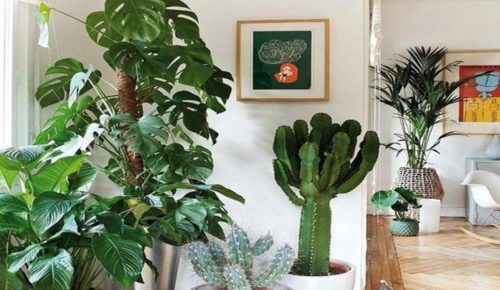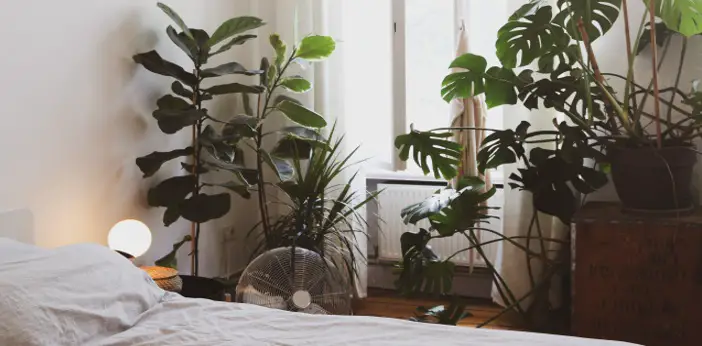According to the principles of Feng Shui, bedrooms are not the appropriate place for houseplants, despite the fact that they can help clean the air and reduce tension.
In this piece, we will investigate the rationale behind this belief and provide replacements for people who still want to include plants in the décor of their bedrooms.
Table of Contents
Why Plants Shouldn’t Be Included in a Well-Designed Bedroom Feng Shui
According to Feng Shui, the bedroom should be treated as a sacred place, dedicated solely to rest and romance. The two of you can relax, re-energize, and grow closer to one another in this tranquil setting.
However, in accordance with Feng Shui principles, it is not advisable to use any decorative elements that might cause an unbalance or attract too much restless energy.
According to Feng Shui practitioners, the bedroom is not the best place for plants. They are representative of the timber element, which is characterized by dynamic upward energy that fosters development, growth, and change.
These are not characteristics one wants in their sleeping quarters. A bedroom should be a place of peace and quiet, free from any stimuli that might disrupt a good night’s slumber.
More than that, plants bring the aspect of water to the bedroom when they are watered. Fire, which stands for desire, intimacy, and romance, is dampened by water.
Relationships suffer when the fire element is depleted, making it difficult to stay passionate and connected.
The bedroom is a symbol of the couple’s commitment to each other. The vibe here should encourage closeness, open dialogue, and reciprocal regard.
The natural flow of energy in a space can be disrupted by the introduction of elements, such as plants, that create an imbalance or attract too much excitable energy, which can lead to disharmony and conflict.
Insights from Research on the Benefits of Having Houseplants in the Bedroom
Some plants, like the peace lilies, are known to purify the air and reduce tension, but this may not be the case in the bedroom.
Many plants release carbon dioxide at night, which may be disruptive to slumber, despite their daytime ability to clean the air and replenish oxygen.
Plants take in carbon dioxide and give off oxygen during the day as part of a process called photosynthesis. At night, however, the process is inverted, and plants give off carbon dioxide while drawing in oxygen.
High levels of carbon dioxide can disrupt sleep, which is especially important given that we spend roughly one-third of our days in bed.
When it comes to keeping pure air in the bedroom, air purifiers are a great option. White noise generators and air purifiers do double duty by reducing breathing-impairing toxins and allergens while also facilitating restful slumber.
In order to drown out annoying sounds like snoring, traffic, or a barking canine, white noise can be played in the background.
Even though spending time gazing at plants can help reduce tension and anxiety, doing so right before bed is impractical. Actually, getting a good night’s slumber is easier if you’re in a dark, quiet, and cool place.
Because of this, it’s important to keep the number of plants in the bedroom to a minimum, particularly if the plants are large or need regular watering.
What Feng Shui Says Are the Best Plants for a Bedroom?
Feng Shui advocates against having live plants in the bedroom. If you absolutely must have plants in your bedroom, there are some precautions you can take to avoid disturbing the chi.
In the first place, pick dwarf varieties so they don’t look out of place. It’s not a good idea to put a large plant in the bedroom because of the amount of light and air conditioning it requires.
Second, move the plants far from the bedroom to prevent them from disturbing your slumber.
The Feng Shui Bagua map suggests placing plants in the east, southeast, and south regions of the bedroom, as these are nourished by the wood element.
Putting plants in these locations is a great way to improve the room’s energy movement and create a relaxing environment.
Cut flowers like peonies are a beautiful option if you favor flowers. Since peonies exude a happy vibe, they’re a great addition to the boudoir, where they can serve as a symbol of love and commitment.
Bringing the beauty of nature into your boudoir can set the mood for romance with just a few stems of cut flowers.
Orchids, serpent plants, areca palms, spider plants, and peace lilies are all suitable options for bedroom plants. Because they remove carbon dioxide from the air overnight, these plants are great for a healthy sleeping environment.
In addition to being visually pleasing, these plants can help create a tranquil environment because of the soothing energy they emit.
Conclusion
Plants are a great way to improve the aesthetics, air quality, and overall wellbeing of your house. Plants that promote relaxation and romance are especially important to have in the bedroom, so it’s important to keep Feng Shui in mind when designing the space.
We spend a great deal of time in our bedrooms because it is a place of relaxation and renewal. According to Feng Shui principles, it is not good to bring in new components that will cause an imbalance or attract too much overly stimulating energy. Consequently, you should give some thought to the plants you bring into this holy place.
Although houseplants aren’t ideal sleeping companions, there are some precautions you can take if you insist on keeping one.
Pick small plants and put them in the corners of your bedroom bagua map that receive the timber element’s energy. Peonies and other cut flowers bring thoughts of love and commitment into the boudoir.
Orchids, snake plants, areca palms, spider plants, and peace lilies are all lovely, living plant choices. These plants are ideal for the bedroom because they absorb carbon dioxide at night and release soothing energy.


